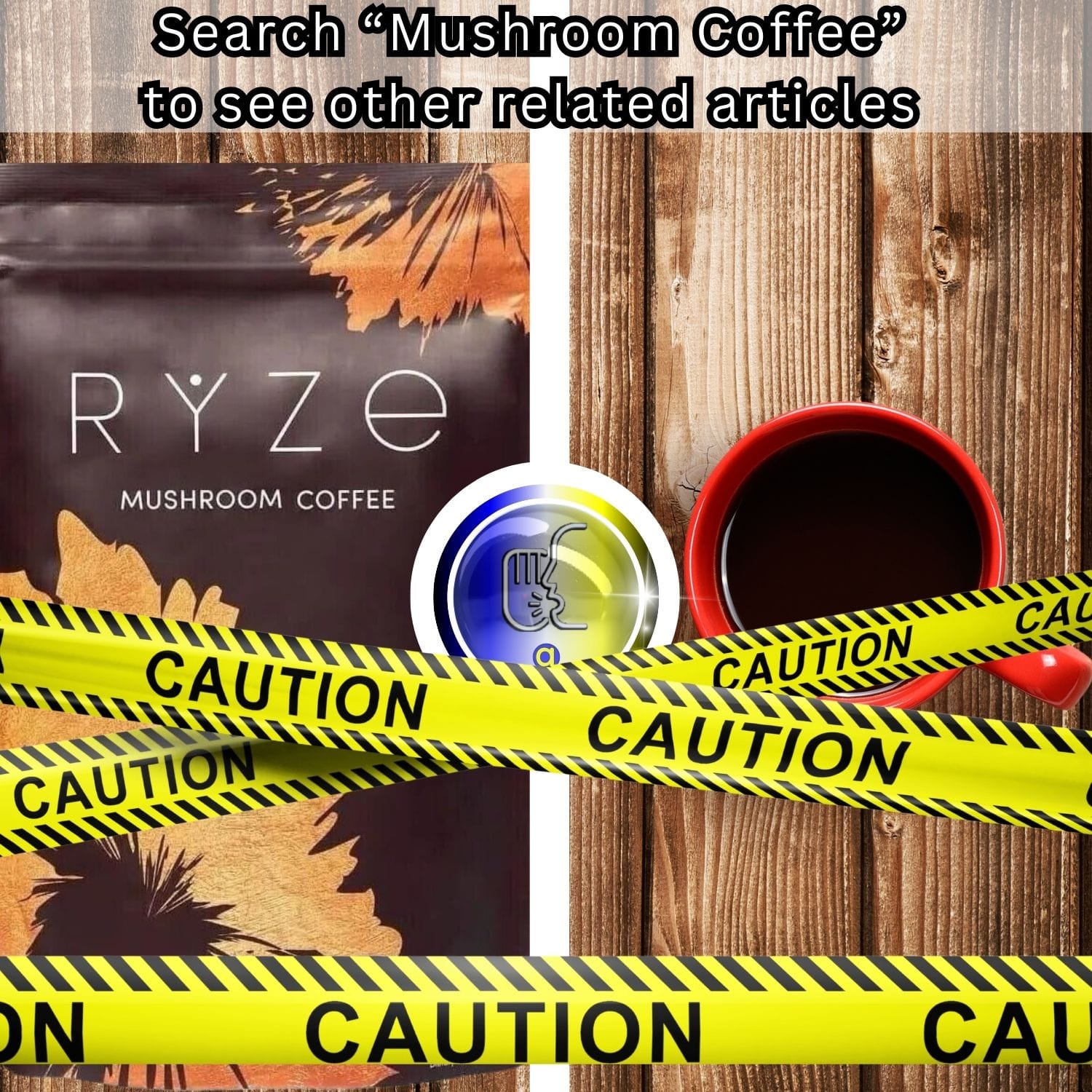Mushroom Coffee has been making Waves in the Wellness Industry
Touted for its potential health benefits and as a trendy beverage alternative to traditional coffee. Brands like Ryze are at the forefront, blending organic arabica coffee with functional mushrooms to create a coffee alternative that promises sustained energy and immune support. But as with any dietary product, it's important to recognize that mushroom coffee may not be a good substitute for everyone. In this article, we'll explore who should steer clear of Ryze mushroom coffee and why.
Understanding Mushroom Coffee
Mushroom coffee combines the rich, earthy flavor of ground mushrooms with the robust taste of ground coffee. This fusion creates a less caffeinated drink that still satisfies the coffee lover's palate. Ryze mushroom coffee, for instance, includes a mix of adaptogenic mushrooms such as lion's mane and reishi mushrooms, which are believed to help the body manage stress and support brain function. The addition of these beneficial compounds to a traditional cup of coffee is what makes mushroom coffees stand out.
The Allure of Functional Mushrooms
Functional mushrooms like those found in Ryze mushroom coffee are not your typical edible mushrooms. They are revered for their medicinal properties, which have been studied for their potential to support the immune system, reduce inflammation, and provide better gut health. These mushrooms are often spray-dried into a pure instant powder and mixed with organic coffee to create a coffee alternative that offers many health benefits beyond a regular cup of coffee.

Who Should Avoid Mushroom Coffee?
Despite the possible benefits, certain individuals should think twice before they buy Ryze mushroom coffee. For example, those with mushroom allergies or intolerances would do well to avoid mushroom coffee. The same goes for individuals with certain chronic diseases that could be exacerbated by the compounds found in mushrooms. It's always best to consult with a healthcare provider before incorporating mushrooms into your diet if you have underlying health conditions.
Potential Drug Interactions
Mushroom coffee contains compounds that may interact with certain medications. For instance, the adaptogenic mushrooms in Ryze mushroom coffee could potentially alter the effectiveness of drugs related to the immune system or blood clotting. If you're on medication, it's crucial to discuss with your doctor whether mushroom coffee is a safe addition to your regimen.
Mushroom Coffee Claim: Separating Fact from Fiction
When it comes to mushroom coffee claim, there's a blend of science and marketing at play. Proponents suggest that combining organic mushrooms like lion's mane with instant coffee can boost energy levels and provide anti-inflammatory compounds. However, it's essential to approach these claims with a healthy dose of skepticism. While some studies, including those referenced by institutions like UCLA Health, indicate potential benefits, the research is still in its infancy. Consumers should look for evidence-based information and consult with a registered dietitian before integrating mushroom coffee into their wellness routine.
On the other hand, many mushroom coffee brands are quick to tout their products as a panacea for various ailments. The truth is, while some components found in mushrooms, such as vitamin D and vitamin B, are known to support health, the extent to which they can prevent or manage chronic disease is not fully understood. It's important for individuals to critically evaluate the marketing claims and consider the actual amount of these compounds present in a serving of ryze mushroom coffee good or any other brand before expecting significant health improvements.
The Cognitive Connection: Lion's Mane and Brain Health
Lion's mane, a key ingredient in many mushroom coffee blends, is renowned for its potential cognitive benefits. Studies suggest that this unique fungus contains compounds that may stimulate the growth of brain cells and improve overall brain function. For individuals seeking a mental boost, incorporating lion's mane into their morning routine could be a game-changer. However, it's important to note that while the research is promising, it's still in the early stages. The Cleveland Clinic has acknowledged the potential of lion's mane, but also emphasizes the need for more comprehensive studies to fully understand its effects on cognitive health.
While lion's mane is celebrated for its brain-boosting properties, it's not for everyone. Some people may experience gastrointestinal discomfort or allergic reactions when consuming this mushroom. Additionally, those with mushroom allergies should be cautious, as lion's mane is still a fungal product. It's always best to consult with a healthcare provider before adding any new supplement to your diet, especially if you have pre-existing health conditions or are taking other medications.

The Synergy of Lion's Mane in Mushroom Coffee
Mushroom coffee enthusiasts often rave about the inclusion of lion's mane, a key ingredient known for its cognitive benefits. But what makes lion's mane stand out in the realm of functional mushrooms? It's the synergy between the natural compounds found in this mushroom and caffeine that creates a unique blend, enhancing focus and mental clarity without the typical jittery side effects of coffee. Lion's mane contains hericenones and erinacines, compounds that stimulate the growth of brain cells and could potentially improve memory and concentration.
Moreover, lion's mane isn't just about the brain boost. This mushroom is also packed with anti inflammatory compounds, which can help reduce the physical stress that often accompanies mental exertion. By combining the cognitive-enhancing properties of lion's mane with the alertness provided by caffeine, mushroom coffee offers a balanced approach to productivity. This synergy is particularly appealing to those who seek a holistic way to support their mental function while also caring for their overall well-being.
The Role of Lion's Mane in Stress Reduction
Lion's mane mushroom, a key ingredient in mushroom coffee, is not just a cognitive enhancer but also a potential stress-reliever. Studies suggest that the adaptogenic properties of lion's mane can help the body cope with stress, both physical and mental. By modulating the levels of stress hormones, such as cortisol, this remarkable fungus can contribute to a more balanced and relaxed state of mind. For those who turn to a cup of coffee in stressful times, mushroom coffee with lion's mane might offer a double benefit: the familiar comfort of coffee coupled with the calming effects of the mushroom.
Moreover, the lion's mane doesn't just stop at temporary stress relief. Over time, its consumption may lead to more profound changes in how the body responds to stressors. This is particularly beneficial for individuals with high-stress lifestyles, as it can potentially reduce the risk of stress-related health issues. The incorporation of lion's mane into mushroom coffee provides a convenient way to harness these benefits daily, making it a smart choice for the modern, health-conscious consumer.
Lion's Mane and Its Impact on Gut Health
The gut-brain axis is a communication network that links your emotional and cognitive centers with your intestinal functions, and lion's mane mushroom has shown promise in supporting this complex system. The polysaccharides found in lion's mane, such as beta-glucans, are known to nourish the gut microbiota, which plays a crucial role in overall health and well-being. By enhancing the growth of beneficial bacteria, lion's mane in mushroom coffee can contribute to improved digestive health, potentially alleviating issues like inflammation and irregular digestion that plague many coffee drinkers.
In addition to its prebiotic properties, lion's mane has been found to have a healing effect on the gut lining. This can be particularly advantageous for those with conditions such as leaky gut syndrome, where the intestinal barrier becomes compromised. Regular consumption of mushroom coffee with lion's mane might help reinforce the integrity of the gut lining, thereby enhancing nutrient absorption and reducing the likelihood of inflammation that can stem from gut-related problems. This positions lion's mane mushroom coffee as a functional beverage with far-reaching benefits for gut health.
Anti-Inflammatory Compounds: The Unsung Heroes of Mushroom Coffee
When discussing the health benefits of mushroom coffee, the conversation often centers around the cognitive perks. However, the anti inflammatory compounds present in functional mushrooms like chaga and reishi deserve their share of the spotlight. These compounds, such as beta-glucans and triterpenoids, contribute to the body's ability to manage inflammation, which is at the heart of many chronic diseases. Regular consumption of mushroom coffee could potentially offer a daily dose of these beneficial compounds, supporting the body's natural inflammation response.
In addition to their anti-inflammatory properties, these compounds also play a role in supporting the immune system. This makes mushroom coffee a beverage of choice for those looking to fortify their body's defenses, especially during times when the immune system might be compromised. By incorporating mushroom coffee into their routine, individuals can enjoy a warm, comforting drink that not only energizes but also contributes to their overall health. It's a win-win for those who are mindful about what they consume and are looking for ways to support their body's natural processes.
Mushroom Coffee and Anti-Inflammatory Benefits
Mushroom coffee is often touted for its anti-inflammatory compounds, which can be a significant draw for health-conscious consumers. The anti-inflammatory properties are primarily attributed to the bioactive compounds found in mushrooms like chaga and reishi. These compounds may help reduce inflammation in the body, which is linked to a number of chronic diseases. The Cleveland Clinic has highlighted the importance of anti-inflammatory foods and supplements in maintaining overall health and preventing disease.
However, while the anti-inflammatory benefits of mushroom coffee are appealing, it's crucial to approach these claims with a balanced perspective. Not all mushroom coffee products are created equal, and the concentration of anti-inflammatory compounds can vary widely. Moreover, individuals with specific health conditions or those taking certain medications should be wary of potential interactions. As with any dietary change, it's advisable to seek guidance from a healthcare professional to ensure that mushroom coffee is a suitable and safe option for your personal health needs.

Exploring Mushroom Coffee Varieties: Beyond the Basics
Diving into the world of mushroom coffee, you'll find that there's more than just one flavor to savor. Many brands offer a range of other flavors to cater to diverse palates. From the earthy notes of chaga to the subtle sweetness of lion's mane, these varieties often come with the promise of being gluten free and dairy free, making them suitable for people with specific dietary restrictions. The process of making these coffees typically involves spray dried techniques to preserve the integrity of the organic mushrooms and the coffee itself.
Moreover, the versatility of mushroom coffee allows it to be enjoyed in various forms. Whether you prefer your brew made with hot water for a traditional cup or blended into a smoothie for an extra health kick, there's a method to suit your lifestyle. Some enthusiasts even incorporate mushroom coffee into their cooking, using it to enhance the flavor of desserts and savory dishes alike. As the trend grows, expect to see even more innovative uses for this functional beverage, as it continues to stir the curiosity of health-conscious consumers and coffee aficionados.
Pregnancy and Breastfeeding Concerns
The safety of mushroom coffee for pregnant or breastfeeding women is not well-established. Due to the lack of research in this area, it's recommended that women who are pregnant or nursing avoid mushroom coffee. The potential risks to the developing fetus or infant are not worth the potential health benefits of mushroom coffee.
Caffeine Sensitivity and Mushroom Coffee
While mushroom coffee may contain less caffeine than a traditional cup of coffee, it's still important for those with caffeine sensitivity to exercise caution. If you find that too much caffeine disrupts your sleep or causes jitters, mushroom coffee might still trigger these unwanted effects. Knowing how much caffeine is in your mushroom coffee and monitoring your caffeine intake is key to avoiding these issues.
Digestive Health and Mushroom Coffee
Some individuals may find that the high nutritional value and fiber content in mushroom coffee can lead to digestive discomfort. If you have a sensitive stomach or conditions like IBS, the addition of mushroom extract to your coffee could exacerbate symptoms. It's essential to listen to your body and determine if mushroom coffee aligns with your health goals.
Autoimmune Diseases and Mushroom Coffee
Mushroom coffee's immune-boosting properties might not be beneficial for everyone. Those with autoimmune diseases should be cautious, as the immune-stimulating effects of certain mushrooms could potentially worsen their condition. Consulting with a healthcare professional is crucial before trying mushroom coffee if you have an autoimmune disorder.
Summary
Ryze mushroom coffee is a coffee alternative that combines the benefits of organic arabica coffee with the medicinal properties of functional mushrooms. While it offers many health benefits, such as reduced inflammation, better gut health, and sustained energy, it's not suitable for everyone. Individuals with mushroom allergies, certain chronic diseases, or those who are pregnant or breastfeeding should avoid mushroom coffee. Additionally, those with caffeine sensitivity, digestive issues, or autoimmune diseases should exercise caution. Always consult with a healthcare provider before adding mushroom coffee to your diet, especially if you have underlying health conditions or are taking medications.
RELATED: Top Recommended Mushroom Coffee Brands
Top Recommended Lion's Mane Powder Brands

FAQ Section
Q: Can I drink Ryze mushroom coffee if I have a mushroom allergy?
A: No, if you have a mushroom allergy, you should avoid mushroom coffee as it contains ground mushrooms and mushroom extract, which could trigger an allergic reaction.
Q: Is Ryze mushroom coffee safe for pregnant or breastfeeding women?
A: The safety of mushroom coffee for pregnant or breastfeeding women is not well-established. It's recommended to avoid mushroom coffee during pregnancy and breastfeeding due to potential risks.
Q: How does Ryze mushroom coffee compare to regular coffee in terms of caffeine content?
A: Ryze mushroom coffee typically contains less caffeine than regular coffee. However, the exact caffeine content can vary, so it's important to check the label and monitor your caffeine intake if you are sensitive to caffeine.







